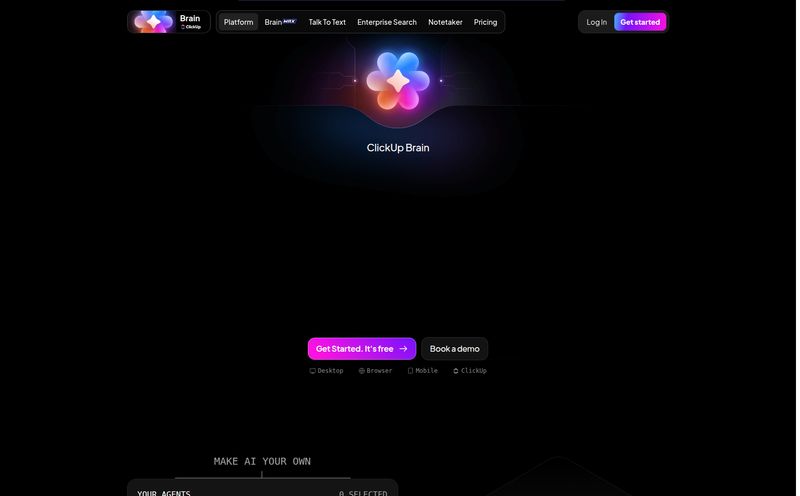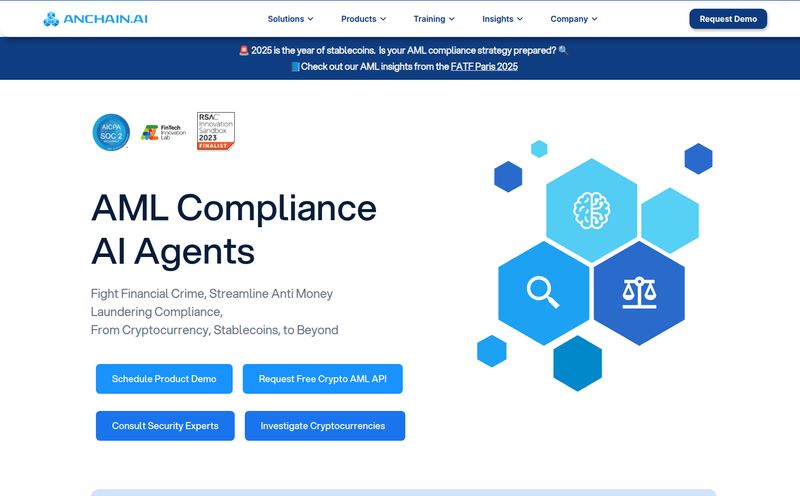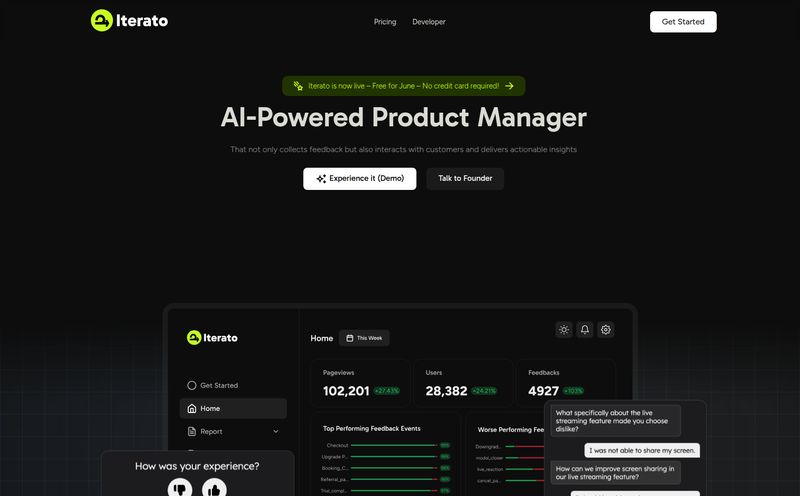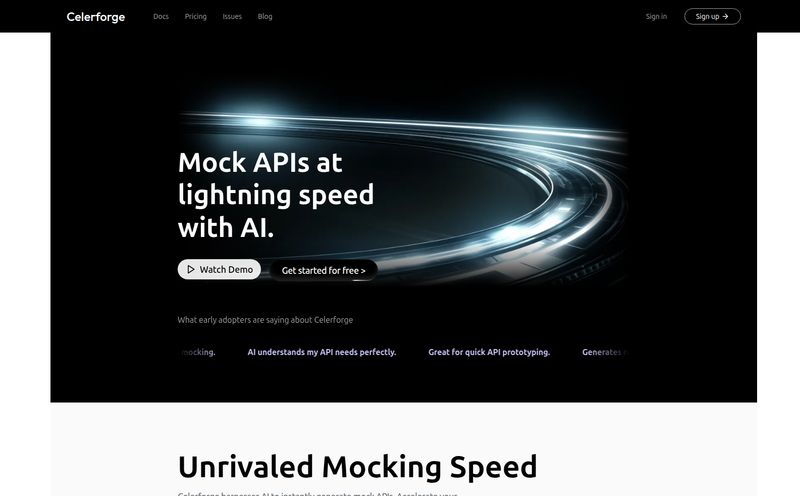Nobody likes debt collectors. For decades, the industry has felt stuck in the past, relying on tactics that often feel more like harassment than help, leaving a bad taste in everyone’s mouth. The endless, poorly timed phone calls, the vaguely threatening letters... it's a model that’s frankly broken for everyone involved. Businesses tarnish their brand reputation, and consumers are left feeling stressed and cornered.
So when a company comes along with a homepage that says “Collect happier,” my inner SEO and trends analyst sits up and pays attention. That company is TrueAccord. They're positioning themselves not just as another collection agency, but as a tech company that does collections. And that, my friends, is a fascinating distinction.
I’ve spent years watching platforms try to “disrupt” old-school industries. Some succeed, most fizzle out. So, is TrueAccord just slapping a shiny “AI-powered” label on the same old process, or have they genuinely built a better mousetrap? Let's get into it.
What Exactly is TrueAccord? (And Why Should You Care?)
At its heart, TrueAccord is a debt recovery platform that throws the old playbook out the window. Instead of a boiler room full of agents making call after call, their operation is built on a foundation of machine learning and digital communication. Think automated, personalized emails and text messages instead of aggressive phone calls.
They handle the entire delinquency process, from the moment an account is just one day past due all the way through to charge-off. The goal is to create a more humane, dignified, and ultimately more effective way to resolve debt. For businesses, this means recovering funds without torching the customer relationship. For consumers, it means offering a flexible, self-serve way to settle up without the shame and pressure. It’s a pretty radical idea in a space not known for its innovation.
The “Secret Sauce”: How HeartBeat is Changing the Game
The core of TrueAccord’s platform is a patented machine learning engine they call HeartBeat. Now, I know what you’re thinking—every company has “proprietary AI” these days. But this seems to be the real deal.
HeartBeat isn’t just a fancy email scheduler. It analyzes millions of data points to figure out the absolute best way to engage with each individual consumer. This is true personalization. It decides:
- The Channel: Is this person more likely to respond to an email, an SMS, or a different channel?
- The Timing: When should the message be sent? Not just the day, but the time of day.
- The Content: What kind of message will resonate? A direct approach? A more empathetic tone? What payment options should be presented?
It’s less of a sledgehammer and more of a series of carefully aimed nudges. The system learns and optimizes over time, so what it learns from one interaction helps it get smarter for the next. It’s basically what we, as digital marketers, have been doing for years with lead nurturing—but applied to the incredibly sensitive process of debt collection. Frankly, it’s about time someone did this.
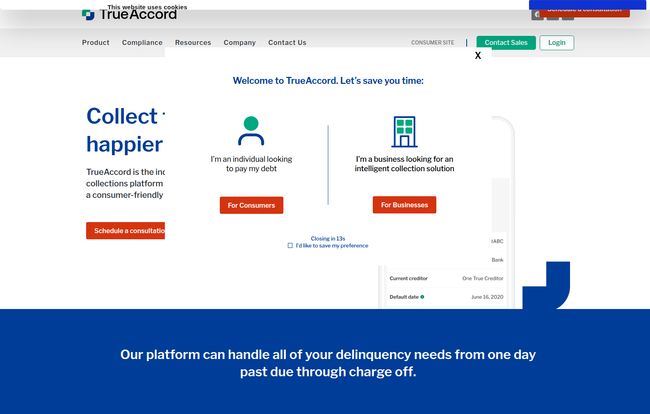
Visit TrueAccord
A Look at the Core Features
When you peel back the layers, TrueAccord’s approach is built on a few powerful pillars.
Machine Learning at its Core
We’ve talked about HeartBeat, but the key here is its ability to self-optimize. This isn't a static set of rules. The platform is constantly running A/B tests on everything—subject lines, call-to-action buttons, payment plan offers—to continuously improve performance. It’s a living, breathing system designed to get better results teh longer it runs.
A Focus on the Consumer Experience
This is the part that really stands out to me. TrueAccord gives consumers a self-serve digital portal. They can log in whenever they want, review their debt, and set up a payment plan that works for their budget, all without ever having to speak to a human agent. This removes so much of the anxiety and friction from the process. It gives the power back to the consumer, which is a massive psychological shift. In my book, that's a huge win.
End-to-End Personalization
This goes beyond just using a {first_name} tag in an email. It’s about crafting a communication journey that feels relevant to the individual. By understanding consumer behavior, the platform can offer solutions that are more likely to be accepted. It might offer a smaller, more frequent payment schedule to one person and a settlement offer to another, based on what the data suggests will work.
Scalability for Businesses
Because it’s a software platform, not an army of people, it can scale almost infinitely. Whether a business needs to collect on a hundred accounts or hundreds of thousands, the infrastructure can handle it. This makes it accessible for fast-growing fintechs and large, established financial institutions alike.
The Good, The Bad, and The Realistic: A Candid Look
No platform is perfect, of course. As an analyst, it's my job to see both sides of the coin. Here's my unfiltered take.
The Upside: What TrueAccord Gets Right
The proof is in the pudding, and TrueAccord claims significantly higher liquidation rates than traditional agencies. And it makes perfect sense. When you treat people with respect and give them control, they're more likely to engage and pay. It's a classic case of getting more flies with honey than with vinegar. For businesses, this means more money in the door while preserving customer LTV (Lifetime Value). You might even win that customer back someday—something that’s almost impossible with old-school collection methods.
Potential Hurdles to Consider
On the flip side, there are some realities to face. The model's heavy reliance on digital channels could potentially exclude less tech-savvy consumers or those without reliable internet access. It’s a valid concern, though I’d argue that demographic is shrinking by the day. Also, this isn't a simple app you just turn on. Integrating TrueAccord requires some technical lift to connect with your existing billing or customer management systems. And finally, the ML is only as good as the data it's fed. Businesses with messy or incomplete customer data will see less effective results. Garbage in, garbage out, as they say.
So, What Does TrueAccord Cost?
This is the million-dollar question, isn't it? The TrueAccord website doesn't list a price, which is typical for B2B platforms of this nature. Pricing is almost certainly customized based on the volume of accounts, the age of the debt, and the specific services required.
Most collection services operate on a contingency fee model, meaning they take a percentage of the money they successfully recover. I would expect TrueAccord to have a similar structure, possibly with setup fees or a monthly platform fee for certain tiers of service. Your best bet is to reach out to their sales team for a consultation and a custom quote. They have a clear 'For Businesses' path on their site to get that conversation started.
Who Is This Really For?
After looking at everything, it's pretty clear who stands to benefit most from TrueAccord.
For Businesses: This is a perfect fit for modern companies, especially in fintech, lending, subscription services, and e-commerce. If you are a business that cares deeply about your brand's reputation and views customers as long-term assets, this approach aligns perfectly. If your primary KPI is recovering money without alienating your entire past-due customer base, TrueAccord should be on your radar.
For Consumers: While you don't choose your debt collector, ending up with TrueAccord is likely a far less stressful experience than the alternative. The digital-first, self-service model offers a level of privacy and control that is almost unheard of in the collections world.
Frequently Asked Questions
- Is TrueAccord a legitimate debt collection company?
- Yes, absolutely. They are a licensed third-party collection agency that is required to comply with federal and state regulations, including the Fair Debt Collection Practices Act (FDCPA). Their website footer lists their NMLS license numbers, showing they are regulated entities.
- How does TrueAccord contact you?
- Their primary methods are digital, such as email and SMS messages. This is the core of their strategy to provide a less intrusive, more modern communication experience for consumers.
- Can I set up a payment plan with TrueAccord?
- Yes. One of the main features is their online self-serve portal, which allows you to view your options and set up a payment plan that fits your financial situation, 24/7, without having to negotiate with an agent.
- Is TrueAccord better than a traditional collection agency?
- It depends on the goals. For businesses prioritizing brand reputation, customer experience, and using data to drive results, the answer is likely yes. Their model is built for higher engagement and satisfaction, which often leads to better recovery rates over the long term.
- What is HeartBeat, in simple terms?
- Think of HeartBeat as the brain behind the entire operation. It's a smart computer program that uses data to figure out the best and most respectful way to communicate with each person to help them resolve their debt.
- Does TrueAccord report to credit bureaus?
- Like most collection agencies, they may report account information to the major credit bureaus (Equifax, Experian, TransUnion). This is standard industry practice. If you are working with them, it's always best to clarify the specifics of how your account will be reported.
My Final Verdict
After digging in, I’m genuinely impressed. TrueAccord isn’t just putting a digital face on an old system; they've rebuilt the engine from the ground up. By shifting the focus from aggressive pursuit to intelligent, empathetic engagement, they've created something that feels more like a 21st-century solution to a centuries-old problem.
It’s not a magic wand. Businesses will still need good data, and there will always be edge cases where the digital-first approach might not be a perfect fit. But the overall philosophy—that you can achieve better financial results by treating people better—is powerful. The idea of “collecting happier” might sound like a marketing slogan, but it seems to be a real, data-backed business model. And in an industry that could desperately use a dose of happiness, that’s a very welcome change.
Reference and Sources
- TrueAccord Official Website
- Debt Collection Resources - Consumer Financial Protection Bureau (CFPB)
- TechCrunch article on TrueAccord's funding and model
